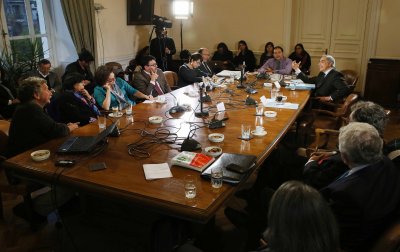 En el marco de la discusión del proyecto de ley de presupuesto 2017, los senadores Guido Girardi, Alfonso De Urresti, Juan Antonio Coloma, Francisco Chahuán, Alejandro García Huidobro, Antonio Horvath y Carolina Goic, miembros y asistentes de la Comisión Desafíos del Futuro, anunciaron su rechazo al presupuesto destinado a Ciencia, Tecnología e Innovación.
En el marco de la discusión del proyecto de ley de presupuesto 2017, los senadores Guido Girardi, Alfonso De Urresti, Juan Antonio Coloma, Francisco Chahuán, Alejandro García Huidobro, Antonio Horvath y Carolina Goic, miembros y asistentes de la Comisión Desafíos del Futuro, anunciaron su rechazo al presupuesto destinado a Ciencia, Tecnología e Innovación.
Los legisladores consideraron muy bajo y “mezquino” el aporte que se prevé para 2017 y anunciaron que solicitarán una reunión con las autoridades económicas pues se está condenando al país a mantener un bajo crecimiento.
El senador Girardi, presidente de la instancia, afirmó que “es inaceptable que Chile que tiene inmensos desafíos a futuro y cuenta con recursos naturales y un potencial enorme, esté condenándose a un modelo extractivista con un presupuesto miserable y vergonzoso destinado a la ciencia, tecnología e innovación.
Precisó que “destinar el 0,36% del Producto Interno Bruto a Ciencia e innovación es mantener los pies atados. Lo que vamos a plantearle al Ejecutivo -con mucho respeto- es que esto es inaceptable. Tenemos jóvenes que se están formando en el mundo y no tienen espacio en el país”.
A su vez, el senador Chahuán, coincidió con su par señalando “vamos a pedir votación separada en cada una de las partidas que se refieran a ciencia, tecnología e innovación. Creemos que si lo rechazamos vamos a forzar que se suplementen más recursos porque es relevante entender que los aportes de becas milenio y otros aportes basales deben extenderse más allá de los 10 años puesto que no se puede forzar a esos equipos a que se financien solos”.
Agregó que “vamos a pedir reunión con el Ministro de Hacienda para pedir un suplemento de los recursos”.
En la misma línea, el senador Horvath comentó que lamentablemente “la autoridad económica no quiere entender que hay ciertas claves para el crecimiento armónico de Chile y sus regiones, una de ellas es la inversión en ciencia y tecnología y el porcentaje que se dedica es mínimo.
“Creemos que formar a un investigador cuesta mucho y no se le da acogida por eso la gente tiene que sentir que se le sacará partido. Hay que empoderar al Estado al sector público y vamos a insistir ante las autoridades económicas que tienen que abrirse a mejores opciones para hacer crecer a nuestro país”.


















 En el marco de la discusión del proyecto de ley de presupuesto 2017, los senadores Guido Girardi, Alfonso De Urresti, Juan Antonio Coloma, Francisco Chahuán, Alejandro García Huidobro, Antonio Horvath y Carolina Goic, miembros y asistentes de
En el marco de la discusión del proyecto de ley de presupuesto 2017, los senadores Guido Girardi, Alfonso De Urresti, Juan Antonio Coloma, Francisco Chahuán, Alejandro García Huidobro, Antonio Horvath y Carolina Goic, miembros y asistentes de